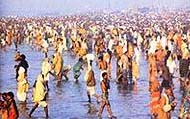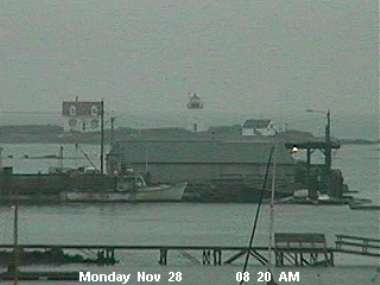|
|
 13 Apr 2006 @ 22:24, by freo7. Environment, Ecology 13 Apr 2006 @ 22:24, by freo7. Environment, Ecology
AND... What the paid USA media ISN'T TELLING YOU !
Is "all this Ascension stuff" for real, or is it just the imbecile fantasy of people deeply divorced from reality? Here is what the media never tells you, at least not all at once.
We all know that the Earth is experiencing global warming and other changes, whether the petroleum giants like it or not. Just read the headlines.
What we may NOT know is the following: More >
|
|
|
|
 28 Mar 2006 @ 10:06, by jazzolog. Environment, Ecology 28 Mar 2006 @ 10:06, by jazzolog. Environment, Ecology
I have deceived the Buddha
For seventy-three years;
at the end there remains only this---
What is it? What is it?
---Suio's Death Poem
Let us endeavor to live so that when we come to die, even the undertaker will be sorry.
---Mark Twain
The snow whisk,
sweeping sweeping,
forgets the snow.
---Basho
Beth Skabar/Athens News Photographer
Elisa Young, a resident of Racine, Ohio, stands in front of American Electric Power's Gavin power plant, a coal fired facility in Gallia County. Young, a member of the SierraClub's executive committee, is concerned about the impact of the coal industry along the Ohio River on the health of her neighbors and the area environment.
As if divinely ordained, on each side of the United States run mountain ranges known as the Appalachians and the Rockies. The symmetry of the arrangement is satisfying to an element of the American character. So far as I know there is no section of the Rocky Mountains known as Rockalalia or Rockyland or some such. But over here there's Appalachia. The exact boundaries of the region are vague and open to dispute. The mountains themselves run from Maine to Georgia, but "outsiders" tend to think of Appalachia as the place where Lil Abner and Snuffy Smith live...and the people must be poor, lazy hillbillies like them. Popular songs of the '40s gave them attributes of a-feudin', a-fussin' and a-fightin', and doin' what comes natur'ly.
It's true the people are independent, strong of opinion (and prejudice---often proud of it: witness the hilarity of redneck humor), and wary of the government and regulation. They're quick to judge whether or not someone is an "outsider" and often put up little tests to check you out---like for instance even how you pronounce the word "Appalachia." You may come from an area of Appalachia yourself, as I do, but still be considered an outsider if your family hasn't been in the region you're in now for a couple hundred years. Where I grew up we didn't think of ourselves as Appalachia because there was no mining there, and for better or worse it's the poverty left by mining that constitutes in the American mind what Appalachia is. At first, coal and timber promised a lasting livelihood, but exhaustion of reserves and technological progress quickly changed the prospects of entire communities. There are towns around where I live now that haven't had real job opportunities in 3 generations...mostly since the mines pulled out and moved on.
Now our locally owned newspaper, The Athens News, has begun a 3 part series entitled "Cradle to grave: Tracking coal's journey through Appalachia." Its author is Katie S. Brandt, an Ohio University graduate student, who comes from Vernon Hills, Illinois, north of Chicago. Even though she's probably been a student here for half a dozen years, she still might be considered an outsider. But the fact is she's been shown around by someone whose credentials are impeccable...and that's Elisa Young. Elisa lives at Racine, by the Ohio River, trying to work a farm organically that's been in the family for generations. She's surrounded by electric companies, powered by coal, that supply an astonishing array of American towns and cities. Her dilemma has become typical of people whose families have owned land in Appalachia---and increasingly everywhere in the US---which is somehow in the path of commercial development. Do you sell out or stay and fight? More >
|
|
|
|
 9 Mar 2006 @ 23:12, by jmarc. Environment, Ecology 9 Mar 2006 @ 23:12, by jmarc. Environment, Ecology
A new species of lobster (or lobstah, as we say up heah in New Hampshah)
has been found more than a mile down in the South Pacific.
Robert Vrijenhoek of the Monterey Bay Aquarium Research Institute in
California organised the expedition that found them. This particular lobster
is so distinct from other species that scientists have created a new
taxonomic family for it. The lobster's pincers are covered with
hair-like strands. More >
|
|
|
|
16 Jan 2006 @ 22:46, by ming. Environment, Ecology
In The Independent, an article by James Lovelock, whom you'll know best as the father of the Gaia Theory. A serious wake-up call there. More than that, really. He says essentially it is too late to back out of what we're doing, and that we're going down, and we've better prepare for being partially wiped out, and Mad Max survival scenarios for those who're left.The climate centres around the world, which are the equivalent of the pathology lab of a hospital, have reported the Earth's physical condition, and the climate specialists see it as seriously ill, and soon to pass into a morbid fever that may last as long as 100,000 years. I have to tell you, as members of the Earth's family and an intimate part of it, that you and especially civilisation are in grave danger.
Our planet has kept itself healthy and fit for life, just like an animal does, for most of the more than three billion years of its existence. It was ill luck that we started polluting at a time when the sun is too hot for comfort. We have given Gaia a fever and soon her condition will worsen to a state like a coma. She has been there before and recovered, but it took more than 100,000 years. We are responsible and will suffer the consequences: as the century progresses, the temperature will rise 8 degrees centigrade in temperate regions and 5 degrees in the tropics.
Much of the tropical land mass will become scrub and desert, and will no longer serve for regulation; this adds to the 40 per cent of the Earth's surface we have depleted to feed ourselves.
Curiously, aerosol pollution of the northern hemisphere reduces global warming by reflecting sunlight back to space. This "global dimming" is transient and could disappear in a few days like the smoke that it is, leaving us fully exposed to the heat of the global greenhouse. We are in a fool's climate, accidentally kept cool by smoke, and before this century is over billions of us will die and the few breeding pairs of people that survive will be in the Arctic where the climate remains tolerable.
By failing to see that the Earth regulates its climate and composition, we have blundered into trying to do it ourselves, acting as if we were in charge. By doing this, we condemn ourselves to the worst form of slavery. If we chose to be the stewards of the Earth, then we are responsible for keeping the atmosphere, the ocean and the land surface right for life. A task we would soon find impossible - and something before we treated Gaia so badly, she had freely done for us.
To understand how impossible it is, think about how you would regulate your own temperature or the composition of your blood. Those with failing kidneys know the never-ending daily difficulty of adjusting water, salt and protein intake. The technological fix of dialysis helps, but is no replacement for living healthy kidneys. Well, I'm an optimist, and I'm hoping for a miracle. But I can't logically think of which corner it would come from. Humanity hasn't really changed its ways, and we're still using nature as something to steal from, and something to dump the waste back into, with little understanding of how things actually work. What arrogance. Hopefully Gaia is more resilient than we fear, and hopefully he's wrong. But what does it take for us to actually change how we interact with the global eco-system? One really big catastrophe, and then we get it? But then it might already be way too late. More >
|
|
|
|

  14 Jan 2006 @ 03:38, by magical_melody. Environment, Ecology 14 Jan 2006 @ 03:38, by magical_melody. Environment, Ecology
Four Days of Pongal
During this period pilgrims from all over the country, in numbers exceeding 500,000 gather on Sagar Dweep, a small island some 156 kilometers (93 miles) south of Kolkata, for the three day Ganga Sagar Mela. The northern extremity of the island, which is about 25 miles long, is called Mud point.
During the Kurukshetra war, it is said, the wounded Bhisma Pitamaha, who had the power to choose the time of his death, lay on his bed of arrows for 26 days so that he could die on Makar Sankranti day. Why Makar Sankranti? “On this sacred day, when the sun begins its northward journey (the uttarayan) by entering the ‘Makar Rashi’ (the Capricorn), the doors of heaven are kept open. All ‘divya-atmas’ (sacred souls) will go to heaven and will be spared a rebirth”, explained Bhisma to Yudhishthira.
Maharashtra - when two persons greet each other on this festive day, they exchange a few grains of multi-coloured sugar and fried til mixed with molasses and say "til gud ghya, god god bola" (henceforth, let there be only friendship and good thoughts between us).
How to Celebrate in the Spirit of Makar Sankranti More >
|
|
|
|
2 Jan 2006 @ 02:30, by Unknown. Environment, Ecology
Well apparently my predictions were "somewhat"
correct.
Heres a article I published on the web back in
Jan of 2005.
It seems my predictions were an under estimation of
the effects of the Tsunami but were some what "perceptive".
_________________________________________________
_________________________________________________
January 5, 2005
9:00 PM MST
Red Deer, AB.
Canada
HEADS UP: The Dec.26, 2004 Quake/Tsunami's Aftermath
WELL...... we seem to have come through the "worst" of the "shift" more or less alright, well perhaps not alright per sae but still basically "intact."
WHAT'S NEXT...... well unfortunately we are at that "time" of "realignment" on
a global basis. What has just occurred is the "shift" or adjustment at the base or root or global geosphere and cycle. This is basically a natural process or condition of
global geospheric "housekeeping" that occurs over the millenniums.
Now the geosphere is basically the base sphere for all intensive purposes of the planet. Resting on the geosphere is the hydrosphere.
When the base or geosphere adjusts the logical consequence is for the hydrosphere to follow and adjust to adapt or evolve to the new parameters.
The hydrosphere or water sphere thus will now become a sphere of concern
for the planet as a whole. This in turn will affect the hydrological cycle itself.
What this means now is that over the next many decades and perhaps centuries
or sooner or later, there will be major changes in water, ice and cloud dynamics.
Page 1 Tsunami Effects
These may result in massive flooding in new areas, severe river channel erosions,
ocean current changes, river flow flooding, tide alterations, new rain and snow patterns etc. etc.
These will more than likely occur on a global scale hence the need to monitor,
model and manage via computer modeling and simulations and satellite methods.
If we are aware that these change may indeed occur then we are in a better position to mitigate or avoid their global effects and effected areas. All areas though will be effected to some degree or other. What will be required is a hydrological engineering project, assessment and system analysis on a global scale, to try to help minimize the effect and damage of changes that may occur.
What can though be done to shape the currents of the worlds natural water processes. Well perhaps not to much. The forces involved are very strong and powerful ones. More powerful than we, I fear. But perhaps not as unexpected as
a global plate shift. The silver lining is that they will probably be occurring somewhat more gradually and with less force hopefully than the earthquake and tsunami of Dec. 26, 2004. We may even be able to predict where and when the changes and stresses will be in the waters ways, currents and cycles if we are wary.
Some of these changes are already apparent as reports indicate that some of the coastlines of the ground zero impact zone are no longer the same.
ALFRED G. JONAS
Page 2 Tsunami Effects More >
|
|
|
|
 16 Dec 2005 @ 10:36, by jazzolog. Environment, Ecology 16 Dec 2005 @ 10:36, by jazzolog. Environment, Ecology
When a thing is funny, search it carefully for a hidden truth.
---George Bernard Shaw
Searching for words, hunting for phrases, when will it end?
Esteeming knowledge and gathering information only maddens the spirit.
Just entrust yourself to your own nature, empty and illuminating---
Beyond this, I have nothing to teach.
---Bankei
Dying cricket,
His song so full
of life.
---Basho
Mary Hufford took this photograph of mountain top removal. This and others are at the Library of Congress site Tending the Commons: Folklife and Landscape in Southern West Virginia. [link]
One of the first questions people ask when they move to a mining area of the Appalachians---or even just drive through mountains of West Virginia, Kentucky, Pennsylvania, Ohio---is "What's happening over there?" They're referring to a startling bare spot on the horizon, out in the middle of nowhere, no towns around, maybe a big crane thing sticking up. What you're seeing is called strip mining or mountain top removal, and the little part of the machine inadvertently visible from the highway might be something like The Big Muskie, which was the largest mobile land machine in the world [link] . It would take a stack of books to describe the history of coal mining and its effect on the lives of the people here---and certainly other regions of the Earth too---but did you know that history continues? Mining goes on here, providing jobs and taking them away, with mountain folks wrestling the same issues they've had to deal with for 200 years. More >
|
|
|
|
1 Dec 2005 @ 15:06, by janos. Environment, Ecology
Uma metáfora para o nosso mundo. More >
|
|
|
|
 28 Nov 2005 @ 13:32, by jmarc. Environment, Ecology 28 Nov 2005 @ 13:32, by jmarc. Environment, Ecology
Dial up warning! If you have less than DSL Speed for a connection, I strongly advise against clicking the below link. More >
|
|
|
|
25 Nov 2005 @ 13:56, by swanny. Environment, Ecology
Quote
**
The first snow... this morning in my little town!
How lovely to wake up to a crispy white morning ..
So unexpected..
Take a deep breath..
Cold!!
Hmmmm!!
Tiger, the pussy-cat, doesn't know what to think of it..
She carefully steps outside, then turns her head around and looks at me, looks back at this strange world again, then shakes her paws and takes a running spurt back into the house, and I laugh..
* * *
Snowflakes...
"How full of the creative genius is the air in which these are generated!
I should hardly admire more if real stars fell and lodged on my coat."
~H.D. Thoreau
* * *
The best snow crystals fall during cold, quiet, light snowfalls, and occasionally you can find some real stunning specimens. Each snowfall has its own character, and each brings its own kind of snowflakes..
[link]
Take a look at their beauty.
White magic..
* * *
I wanne go outdoors now..
See ya!
*R*I*A*
Heh heh. First snow here yesterday, cat tried the "sniff test" three times, running back in, and the third time I threw her out a ways and she took off happily. For her, this is the first snow underfoot.
She's been hunting lately, leaving offerings on the stoop.
She moves to the lake with S and A soon... no traffic. We will miss her.
Cold here. The deep sleep begins...
A.
Ah snow and crystals....
we had really nice and warm stuff here
although they say its to get colder now
now ... Now is approx morning Novem 25 2005
ah it Friday aye? thank G its Friday?
ah maybe.... why? thank G for time?
why? time is all we've got ? for a while?
whatever... but back to the topic
fleeting beauty.... yes beauty is fleeting
the desire to hold on to beauty is proportional
to the appreciation of it...
and some appreciate beauty not or differently
perhaps...
although there is beauty and ugliness together
in most things hard to find beauty sometimes
and when found yes it is often fleeting
hard to find the beauty in ugliness as well
yet in togetherness is their worth
without ugly would there be beauty and without
beauty would there be ugly....
oh.... this is not poetic....
this is anaylsis or overanalysis....
this is trying to finding some underlying meaning or
understanding when all it began as was
the "appreciation" and thanks for a "drop" of beauty
from the heavens.....
why question the gift.....
ah I have lived to long perhaps....
have forgotten how to be simple.....
how to find meaning in the simple appreciation of all
that is.....
I have an interesting place.... and now ....
well now is alright....
the fridge hummminng away..... the birds having
their porridge.... hee hee
the radio and tv off.....
the sounds of silence from the street
the sounds of a city waking and the sun
streaching to the horizon.....
and wondering perhaps what this day holds
or what I choose or wish "to make" of this day....
a day that on the surface seems like so many other days
yet snow has fallen in holland and cats are playing
and cats and snow is falling in the USA and cats are
playing and its dark and cold in alberta but the place is
warm and dark....
Is there beauty here in this silence?.....
I suppose the continuum of life....
the continuum of now......
thankyou you rhea for the crystal
and you have gone out to "experience" and here I experience
it as well so thanks for sharing your beauty with me here
in this silent darkness.....
I can only imagine it though... or?
well.... teatime
sir
Blessed are We and They
That serve Love and Truth
Most of the time.
Alfie More >
|
|
<< Newer entries Page: 1 ... 4 5 6 7 8 ... 13 Older entries >> |
|